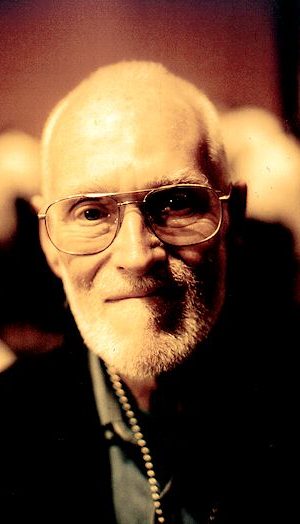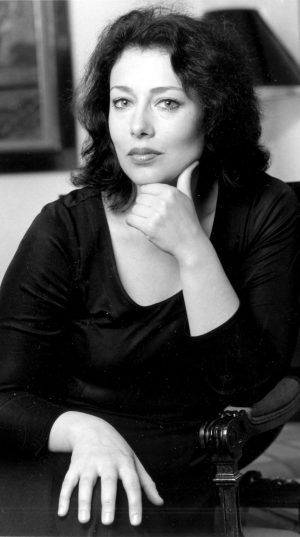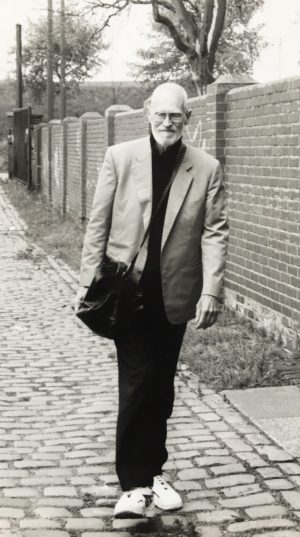The Russian pianist Masha Dimitrieva is a pioneer in opening up the works of Gordon Sherwood, and his piano concerto is also dedicated to her. Oliver Fraenzke met her for an interview.
Gordon Sherwood remains a completely unknown composer who never sought fame and whose music was mostly known only to his friends. You are considered the discoverer of his music, Ms. Dimitrieva, and the first to perform it on a large scale and record it on CD. But how did you become aware of him and get to know him? In a short video excerpt on the homepage www.gordonsherwood.de, during the work on his piano concerto, it says that you too had only been in Germany for a short time when you met him. Where were you at that time, how did you get to Germany and how far were you on your path to music at that time?
After graduating from the Moscow Tchaikovsky Conservatory in 1991, I came to Hanover in early 1992 for further studies at the Hochschule für Musik und Theater, where I attended the master class with Prof. David Wilde. As a great English pianist and composer, he was the one who introduced me to
modern, contemporary Western works such as those by György Ligeti, Hans Werner Henze or Helmut Lachenmann and thereby also broadened my musical horizons. During my student days at the Tchaikovsky Conservatory in the then Soviet Union, there were
in the field of modern music only Russian composers represented, for example: Georgi Sviridov, Mieczyslav Weinberg, Galina Ustvolskaya or Sofia Gubaidulina, to name a few.
While still at the conservatory, I had the good fortune to play the great Sofia Gubaidulina’s ‘Chaconne’ for piano and subsequently receive her comments and corrections. This made me curious about further encounters with composers and the possibility of working together on their works.
I enthusiastically “threw myself” into the modern and partly unknown musical terrain, in order to later dedicate myself to my artistic credo of “making the unknown known”…
I had only been in Germany for about four years when I happened to see the film “Beggars in Paris” (by Heiner Sylvester and Erdmann Wingert) about the American composer Gordon Sherwood on Arte. I was very impressed by the story and the music of this unusual man. I really wanted and needed to meet him. So I called the TV station and asked for Sherwood’s address. Sherwood had not left an address, but he had left many telephone numbers of his friends, who were spread all over the world. That’s how they were able to track him down. Through a friend who was a musician in Paris, I found Gordon Sherwood, who was in France at the time. I introduced myself to Sherwood by phone and invited him to come to Bremen.
After some time, he actually came to visit me …
Our encounter was very intense from the beginning. When he came to my house, right after the short greeting, he asked me to play something for him; it was about 10:30 in the morning. After the first piece, he always wanted to hear more pieces from my repertoire, starting with sonatas by Domenico
Scarlatti to the later works of Alexander Scriabin. If Gordon did not know a work, he would ask for the sheet music in order to study the work and to internalise the composer’s compositional ideas. After this ‘audition’ there were discussions about the development of music and his aim to compose in all styles and forms. At about 9pm we finished this extraordinary ‘music marathon’. Already 67 years old at the time, this man apparently knew no fatigue or time when it came to music.
“Life is far too short and you can and should learn as much as you can in that time,” has been Gordon Sherwood’s motto. And something else was important to him – it was Gordon’s special way of getting to know the musician and the person behind it. He was always curious: about music, about people, countries and different musical traditions; he was open to new things, always ready to learn, to finally integrate all these impressions into his work.
Sherwood is often described as a man of extremes, who refused permanent employment despite good pay, who at times even worked as a beggar and composed at night, who travelled the world as a Buddhist and vegan (even before it became a real trend, as it is today) and honed his art in the process. This is the kind of thing that fundamentally shapes a person’s
human intentions and views, it increases the focus on certain aspects. What was Sherwood like as a person? What were his goals, musically and extra-musically? What was important to him and what distinguished him?
Gordon Sherwood was a go-getting, itinerant free spirit who never lost his curiosity for life until his final years. His almost unquenchable thirst for knowledge and insight have led him as a wanderer across the globe and through the most diverse cultures. This experience served a constant musical development, which is noticeable in his stylistically so different music. One can say that Sherwood musically “embraced” the world, the world with all its richness of sounds and impressions. His heart and mind, his compositional feelings and thoughts were always on the lookout for new impulses, only to unite them with classical forms.
“I have to write down the new thoughts and ideas immediately. That’s why many of my pieces are still unfinished. That makes me quite nervous. If I could live for 200 years, then maybe I could realise all my ideas,” Gordon Sherwood often said. In fact, sometimes there are several years between the first idea and the execution of a composition. Many of his thoughts lay dormant for years until they were taken up again by him at some point. This was also the case with the Piano Concerto op. 107, which Gordon Sherwood dedicated to me. The sketches for the piano concerto were written in the late 1950s. It was only in the 1990s – shortly after our first meeting – that he completed the concerto. The classical form in three movements is full of harmonic richness and technical difficulties, for the soloist
as well as for the orchestra. Gordon used to say about the concerto that it was a “battle” between soloist and orchestra. Working on the piano concerto with the composer and man Sherwood was extremely interesting and instructive for me. Gordon started composing every morning at 7 o’clock, later he went through what he had composed with me. He already had the music and the movements completely in his head, whereupon he wrote them down purely in his calligraphic handwriting. After the audition, he entered the necessary corrections in the score. The piano concerto is rich in great dramatic tensions, climaxes and sombre moments, which are then finally resolved by a climax.
The highest priority for Gordon when composing this piece was the beauty of the music. He had many friends and supporters, spread all over the world, who appreciated not only his music but also the person Gordon Sherwood. I myself experienced him as a very affable, polite, but also determined man, who on the long evenings at my house, with vegan food and a glass of good wine, talked about his highly interesting travels or discussed the music. His life was full of adventures, sometimes very brutal. However, he has not lost his
optimism until his death, his love of music always gave him the necessary strength.
“Music has always been an elixir for my spirit. I can best use it to express my longing for beauty and my abhorrence of disease and war. But music is one thing, language is another, and there are really no words to describe the effect music has on me…”
There is a biography, written by Sherwood himself, of about 1000 pages, in which he describes his – not always easy – life in the most diverse places on this earth. The criteria of his life and work were always in opposition to the ‘normal’ bourgeois world. Independence and
Freedom, escape from all social ties and obligations were the most important characteristics of his actions, along with music.
As a young man he won the Gershwin Competition, the most prestigious composing competition in the USA. At the beginning of a great career, he suddenly turned his back on the hated culture industry and opted for a nomadic life. He lived in Lebanon, Egypt, Israel, Greece,
Kenya, Costa Rica, China – to name a few of his stations. When the money ran out, he went to Paris to spend a few years as a beggar to raise money for the trips. He called this “self-sponsoring”. And then he travelled again… All over the world he found the friends and patrons who offered him accommodation and support so that he could put his musical ideas on paper….
The central theme for Sherwood was time. His time was too limited to satisfy his curiosity about life. “I never had time to run after other people, to look for conductors to perform my works.
. I never had the time for it because I was always busy with new ideas,” says Sherwood.
Gordon Sherwood enjoyed his education with profoundly different great teachers: Aaron Copland, one of the fathers of modern American music; Philipp Jarnach – one of Germany’s leading composers between the two world wars and, as a member of the Novembergruppe,
associated with some of the greats of the time, such as Kurt Weill, George Antheil, Max Butting, Hanns Eisler, Stefan Wolpe or Heinz Tiessen (Celibidache’s now forgotten teacher, who, according to his own statements, owed everything to Tiessen); as well as Goffredo Petrassi, who, after clashes with the
neoclassicism and serialism created a style entirely his own. How were these musical contrasts of his apprenticeship years reflected in his work? Could he unite them, and if so, how? Sherwood also mentioned Shostakovich, Bartók, jazz and blues as other influences – does this all have a place in Sherwood’s personal style, and does the same apply to the music of all the countries Sherwood travelled and explored?
After mentioning such a stylistic pluralism, the general question should be asked: What is Sherwood’s music actually like, how can it be described, what makes it special?
Gordon Sherwood’s oeuvre is very extensive. His catalogue raisonné contains about 143 entries. They include orchestral works, operas, cantatas, choral works, very extensive chamber music (piano music, works for various string and wind instruments), ballet music, religious works, vocal music (over eight cycles with his own texts), film music and others.
Stylistically, the compositions are influenced by his American models – Gershwin, Copland, but also Stravinsky, Bartók, Hindemith. A characteristic style of his music is the fusion of the classical with Indian and Arabic elements, but also with elements of jazz. This results in Sherwood’s highly characteristic musical style. Despite complex structures and dense voice-leadings, such as in his orchestral works, his music has a personal, unmistakable language, which facilitates access even for the untrained listener. His music is powerful, very rhythmic, polyphonic, but more often vocal and melancholic. Profundity, variety of sound and expression, strength of feeling, wealth of ideas and original ideas are characteristic features of his music.
They spoke of long music-filled days full of exciting conversations about his work, about the influence of music by other composers as well as about his travels – as well as about the intensive collaboration on his piano concerto. How has Gordon Sherwood influenced and inspired you?
Has contact with him changed you, as a person and as a musician?
Certainly the friendship with Gordon, both in a musical and human sense, has given me a lot.
It may sound pathetic, but his great, fanatical and very honest love for music has impressed and inspired me to the highest degree.
He was like a burning, incredibly honest bundle of energy for me, who never got tired when it came to music. He could literally infect people close to him with this fire. We musicians love music, practice our profession with dedication, but we also take breaks, keep us busy
with other, more everyday and sometimes comparatively downright mundane things. Gordon did not know that. He was, so to speak, an “absolute music priest”; his god was music, to which he passionately devoted himself
every minute of his entire life. This infinite, burning and intoxicating power of his creativity, regardless of all the circumstances in which he lived, this insatiable curiosity for the new, the unknown only extinguished with his death.
I was also impressed by his view of the world and of people. Gordon did not like compromise. He was very sensitive and profound about the different human characters. He would never, even for a better engagement or an advantage for himself, have compromised with someone he did not like or respect. The people he met, he loved or hated; and the friends he had were honest people who loved him.
Sherwood was, as already mentioned, a Buddhist, but nevertheless wrote countless works with a decidedly Christian reference, such as the Three Sacred Pieces Op. 35 or the Beggar’s Cantata. How is it to be explained that Gordon Sherwood writes sacred music for one particular religion and yet belongs to another? Are there also works for other religions in his oeuvre? And how does the sacred stand out in his music?
Gordon Sherwood’s relationship with God was difficult. There was a Christian phase in Gordon’s younger years, later he professed Buddhism. When I met him almost 20 years ago, he had become an atheist.
Gordon’s faith was more a faith in life, in nature – as can be experienced, for example, in the “Five Pieces Depicting the Beauty of the Jaranda Trees” Op. 63, in which he praises the beauty of nature, of trees and blossoms.
His view of Buddhism is reflected in “Hare Krishna Finca Hare Krishna” op. 95. However, this work should not be seen as the work of a devout believer, but more as the work of a seeker, an experimenter who was curious about the new colours of sound.
There is nothing in the “Beggar’s Cantata” op.99 that could be described as sacred. Die Kantate ist eher eine „Dokumentation“ einer Periode seines Lebens, als er das benötigte Geld als Bettler in Paris beschaffte.
Incidentally, he wrote the text for the “Beggar’s Cantata” himself, as well as the texts for the many different other vocal works and vocal cycles.
Unfortunately, all of these works have not yet been premiered.
As for the Three Sacred Pieces op.35 – they were certainly influenced by his great love of Bach – you could call them a sacred “experiment”, an incredibly successful and also honest “experiment” with music that leaves goosebumps. Until now, only the “Ave Maria” from this cycle has been performed.
A quote under his Op. 50, “Boogie Canonicus. Nine Boogie-Woogie and Blues Pieces in Canon Form for Piano Solo”. Dort steht: “Es gibt neun Kanons in Bachs ‘Goldberg-Variationen’. Beethoven hat neun Sinfonien geschrieben. Es gibt neun bekannte Planeten im Sonnensystem, also habe ich hier aufgehört”. Two musical references are juxtaposed here with a physical-astronomical one to justify the number nine. Are such associations more frequent in Sherwood’s work, and did he perhaps also relate and combine fundamentally different elements in everyday life?
Gordon had a penchant for number mysticism, as, incidentally, did some other composers. There are about 20 notebooks in which he researched various numbers and their relationships to each other. There are, for example, the distances from one city to another in kilometres, time and speed listed; or also bar numbers of his works, amounts of money, imaginary time calculations, etc. Gordon loved the world of numbers, it occupied him. The numbers meant order, they gave him a sense of order in the chaotic, unsteady life he led….
They said Sherwood had made friends and supporters all over the world. On the one hand, the question comes to me, how did he do such a thing, how was he able to win important friends and sponsors as an unknown ‘beggar’, what made this talent? And secondly, how could he remain so completely unestablished despite an international following to this day?
Gordon Sherwood has described himself as “the world’s most famous of all unknown composers”.
An important reason for his low profile as a composer lay in himself. He had the best prerequisites for a career. As a young man, he won several major composition prizes and grants, including the aforementioned First Prize in the prestigious George Gershwin Composers Competition in 1957, a Fulbright Scholarship for further study in Germany.
His teacher at the Hamburg Musikhochschule at the time – Philipp Jarnach – described him as the most talented and promising composer to have been trained at the Musikhochschule for 20 years.
Gordon did not seek advantages for himself, he did not know how to use it all for himself monetarily and reputationally and refused all the positions that his talent had opened up for him. Gordon despised the music business; he did not fit into any ‘normal’ framework, neither as a composer nor as a person, and did not want to fit into one for anything in the world.
And the fact of not having a powerful manager or impresario to make a big name out of him has given him a very different life. Anstatt des geregelten Musikbetriebs entschied er sich für ein abenteuerliches und unglaublich bewegtes Leben. His uncompromising personality was very impressive, even fascinating. Those people who met him could not forget him so easily.
Many musician friends who held him and his music in incredible esteem have tried, to the best of their ability, to give his compositions a public ‘life’. However: without appropriate management and PR marketing, this is certainly an eminently difficult task.
A task that can perhaps now be made up for after his passing in 2013. It is wonderful to see excellent musicians like you dedicate yourselves to such a master, who is probably also less marketable for the artists than, for example, a new recording of Beethoven sonatas. It
remains to be hoped that the “best known of the unknown composers” will soon perhaps be the “least known of the known composers”. With this in mind, thank you for the interview and for your time.
[Interview conducted by: Oliver Fraenzke, 2017]
Original text at:
Aus dem Leben eines Bettlers – Masha Dimitrieva über Gordon Sherwood | The New Listener (the-new-listener.de)








![w557_h960_x278_y480_DC_CO3_2620_623-G0J4UJ2BO.1-ORG-79c8e087547b4e8c[1] w557_h960_x278_y480_DC_CO3_2620_623-G0J4UJ2BO.1-ORG-79c8e087547b4e8c[1]](https://sonuseterna.com/wp-content/uploads/2018/01/w557_h960_x278_y480_DC_CO3_2620_623-G0J4UJ2BO.1-ORG-79c8e087547b4e8c1-300x537.jpg)


